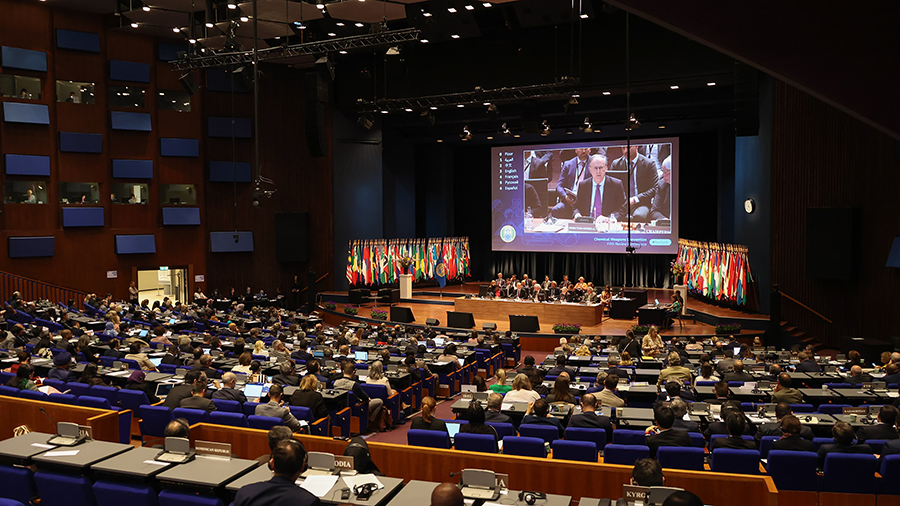“For half a century, ACA has been providing the world … with advocacy, analysis, and awareness on some of the most critical topics of international peace and security, including on how to achieve our common, shared goal of a world free of nuclear weapons.”
CWC Review Conference Fails to Achieve Consensus
June 2023
By Mina Rozei
States-parties to the 1997 Chemical Weapons Convention (CWC) failed to agree on a joint outcome document at the conclusion of their fifth treaty review conference May 15-19 in The Hague.
 After an opening round of general statements and consultations and more than two days of closed-door debate in the committee of the whole, Russia and Syria blocked adoption of the draft outcome document because they objected to any mention of Syria’s well-documented chemical weapons use. Lacking consensus, the conference ended with a chairman’s report that summarized the week’s proceedings.
After an opening round of general statements and consultations and more than two days of closed-door debate in the committee of the whole, Russia and Syria blocked adoption of the draft outcome document because they objected to any mention of Syria’s well-documented chemical weapons use. Lacking consensus, the conference ended with a chairman’s report that summarized the week’s proceedings.
Henk Cor van der Kwast of The Netherlands, conference chair, attributed the lack of consensus to a “lack of time” because member states of the Organisation for the Prohibition of Chemical Weapons (OPCW) allowed only one week for the conference.
In a May 20 statement, the U.S. State Department said Russia “repeatedly obstructed these efforts to negotiate in good faith throughout the process and prevented consensus on a final outcome document despite the majority of the issues receiving broad support.” It also noted that “more than 70 delegations, including the United States, joined a statement pledging to advance a positive agenda for the OPCW.”
In January 2023, the OPCW's Investigation and Identification Team (IIT) concluded that there were “reasonable grounds” to believe that the Syrian military dropped two yellow chlorine gas cylinders on two apartment buildings in Douma, Syria, in 2018, killing 43 people and injuring many more. Russia and Syria have claimed that this attack and others attributed to Syria were staged by Syrian opposition forces.
In 2013, following a large-scale attack by Syrian forces on the outskirts of Damascus against rebel-held positions, Syria was pressured to join the CWC, declare its chemical weapons arsenal, and accept a plan developed by Russia, the United States, OPCW, and United Nations to remove and destroy its stockpile of chemical weapons and production capabilities. Since then, the Syrian regime of President Bashar Assad has denied OPCW staff access to inspect its chemical weapons stockpile to verify the completion of the process and the accuracy of its declaration. (See ACT, March 2023.)
Held 25 years after the CWC’s entry into force, the review conference underscored the widespread global support for the treaty and the successful elimination of most of the declared chemical weapons stockpiles once possessed by its states-parties. The United States reaffirmed that it is still on track to complete the destruction of the last remnants of its once vast chemical weapons stockpile before a Sept. 30 deadline.
But the conference also underscored how geopolitical tensions between Russia and many other states are straining the CWC regime. In a statement to the conference, the head of the Russian delegation, Kirill Lysogorskiy, asserted that the 2018 decision authorizing the OPCW Technical Secretariat to identify the perpetrators of chemical weapons use in Syria is “destroying the integrity of the CWC and the credibility of the organization.” He insisted that it “goes beyond the organization’s mandate and encroaches onto the exclusive competence of the UN Security Council.”
Lysogorskiy also reiterated Russia’s rejection of investigations that show that its security forces were responsible for poisoning Kremlin political opponents with banned chemical agents.
A new theme at this conference was the opaque process by which nongovernmental organizations are accepted or rejected for participation at OPCW meetings. There was strong civil society participation in the open sessions, and nongovernmental representatives were allowed to deliver topical presentations to the plenary. But several organizations with relevant expertise and standing were rejected without explanation by the general committee of the OPCW that handles accreditation, raising questions of possible political bias.
Despite the inability to achieve consensus on a final outcome document, OPCW Director-General Fernando Arias emphasized in his closing remarks that the “common ground that was found and national documents that were produced will provide strategic guidance for the tasks that the OPCW will carry out in the future.”
